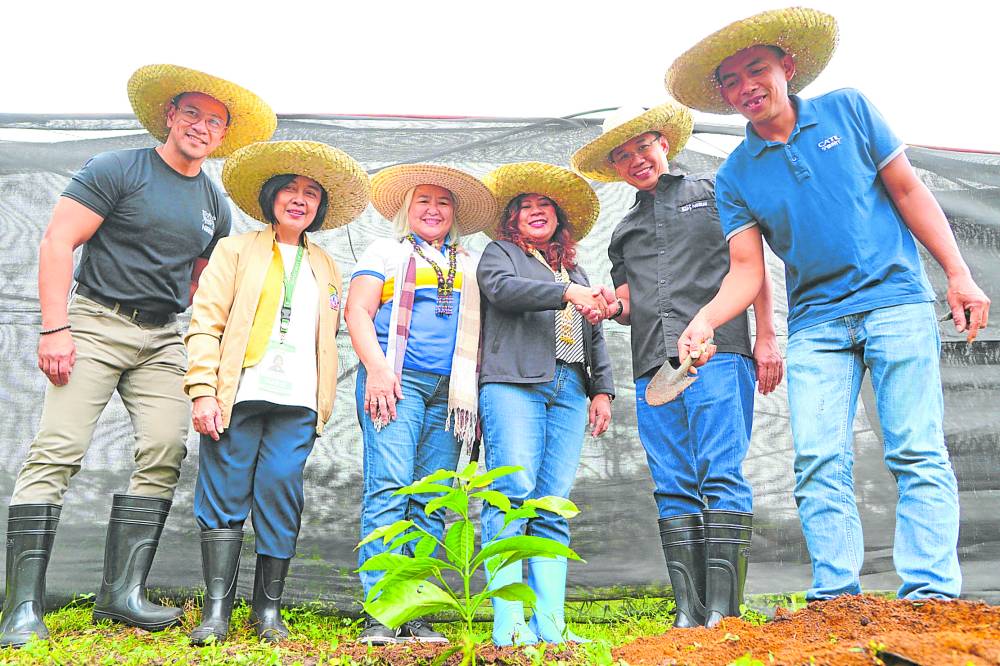
SEASON STARTER Officials of Nestlé Philippines and the Department of Agriculture join Arnold Abear, a farmer-beneficiary of the “Nescafé Plan” initiative, in a symbolic planting of a Robusta tree to mark the start of the coffee season as well as the celebration of the National Farmers and Fisherfolk Month at the Bukidnon Integrated Coffee Center. —PHOTOS FROM NESTLÉ
Behind every steaming cup of coffee in the morning, which many Filipinos simply cannot do without, are hardworking farmers who unfortunately do not always get the appreciation and support they richly deserve.
Nestlé Philippines and the Department of Agriculture (DA), however, are keenly aware of their outsized contribution to the economy and to people’s very survival.
The two institutions, thus, celebrated National Farmers and Fisherfolk Month in May by recognizing 24 outstanding coffee farmer groups from Northern Mindanao and Soccsksargen—two of the top coffee-producing regions in the country.
These award-winning groups are among the first to receive fertilizer support from the Mindanao Robusta Coffee Project (MRCP), a joint project of the DA and Nestlé Philippines.
Aimed to improve the production and sustainability of Robusta coffee farming in Mindanao, the MRCP is a five-year agreement between the DA and Nestlé to energize every step of the coffee value chain through five main areas. These are research; fertilizer assistance; upskilling of farmers; establishment of coffee centers; and logistics and marketing.
The fertilizer assistance was also an offshoot of the research trial conducted by University of Southern Mindanao and Nestlé Philippines that will provide the best model of fertilization using a combination of organic and inorganic fertilizer to boost coffee yield.
This contributes to MRCP’s main objective, which is to develop appropriate and cost-effective, climate resilient production technologies for Robusta coffee, the main ingredient in instant coffee.
According to the Philippine Statistics Authority, Robusta is the most-produced type of coffee, accounting for more than 70 percent of the country’s total coffee production. Unfortunately, this is still not enough to meet the country’s growing needs.
At present, the Philippines can only produce 38 percent of what it needs, which means it has to rely heavily on imported coffee—mainly from neighboring Indonesia, Malaysia and Vietnam—to meet local demand.
While it is lamentable that the Philippines has to import so much coffee, it also presents an opportunity for local coffee farmers to earn more by meeting the demand and thus help minimize the country’s exposure to fluctuations in global prices and foreign exchange volatility.
Smallholders
Nestlé is doing its share in boosting local production through its Nescafe Plan, which seeks to help coffee farmers become “agripreneurs,” increase their yields and income through better coffee varieties, planting techniques and quality inputs.
Smallholder farmers are the primary beneficiaries as these farmers, who till about one to two hectares each, produce as much as 80 percent of the Philippine’s entire coffee output.
Consumption increases every year but production has not been able to keep up with the demand due to key challenges.
These include aging trees, limited farmer’s access to quality planting materials and funding as well as climate change that has wreaked havoc on the planting cycle and planting conditions.
Nestlé Philippines chair and CEO Kais Marzouki, however, has assured these farmers of the company’s unwavering support, given that it is also in the multinational company’s best interest to source as much coffee from local producers as possible, to be processed at its coffee processing plant in Cagayan de Oro.
“As the country’s largest coffee manufacturer, we prioritize domestic sourcing from smallholder coffee farmers rather than imports, to contribute in the long-term to the growth of agriculture and the economy. We envision a future when the Philippines will be self-sufficient, perhaps even resume exporting coffee,” Marzouki said in a statement.
The Nescafe Plan, through its initiatives such as Project Coffee+ in cooperation with GIZ (the German state agency for international cooperation), demonstrates the advantage of training farmers in entrepreneurship, good agricultural practices, and regenerative agriculture to safeguard their farming resources for continued and greater productivity, and adapting to climate change.
CASH CROP Cheryl Caballero, Agriculture Undersecretary for High-Value Crops, examines robusta trees.
Biz school
Since Project Coffee+ began in 2018, 1,500 farmers in Bukidnon and Sultan Kudarat have completed training in coffee-based diversified farming and agricultural entrepreneurship through the Farmer Business School.
To sustain efforts to upskill farmers on Regenerative Agriculture, Nestlé Philippines has embarked on the second phase of Project Coffee+ to train another 1,500 farmers, with added focus on regenerative agriculture in the production of Robusta.
Apart from the increase in yield, farmer participants also succeeded in doubling their net farm incomes, said Nestle. As a result, more than 80 percent of Project Coffee+ beneficiaries have already crossed the poverty threshold.
The DA, meanwhile, is allotting resources and effort to drive the production of high-value crops including coffee.
Under its High-Value Crops Development Program, the DA is committed to provide end-to-end support for farmers and producers through education and training programs, as well as provision of equipment and tools that will help them produce high-quality and high-yielding crops.
To mark another year of cooperation, DA and Nestle representatives planted a Robusta tree at the DA office in Bukidnon, signaling the beginning of the coffee planting season for 2024 to 2025.
This also came with the call for more farmers to adopt regenerative agriculture to reduce the impact of climate change while preparing the farms for the next generation of coffee farmers.
These regenerative farming methods that should make the farms more productive while keeping Mother Nature happy include intercropping, composting, agroforestry and planting of cover crops to improve biodiversity and restore nutrients of the soil, contributing to improved coffee quality and quantity.
With Nestle and DA helping more farmers adopt these proven methods to significantly increase yield, the Philippines should see more coffee proudly grown and harvested by Filipino farmers for Filipino consumers.